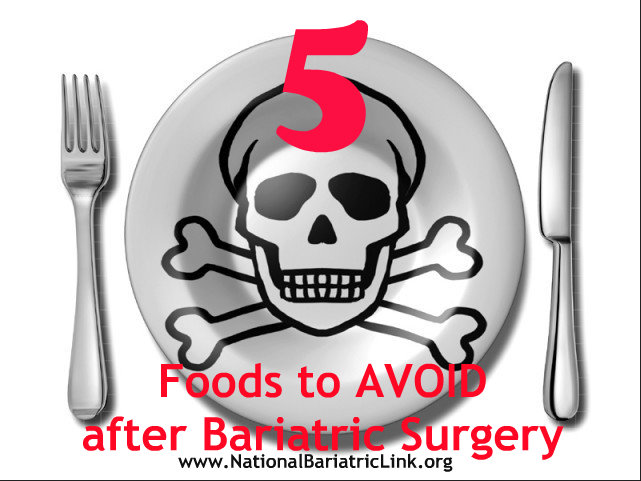Five Foods to Avoid after Bariatric Surgery
Bariatric surgery is not an instant solution to losing weight, as you will still have to make the right food choices. Once your doctor tells you it is okay to eat solid foods, you will not be able to eat anything you like. There are several foods and drinks that you should never consume again. Here are the top four foods to avoid after weight loss surgery.
Breads, Pasta, Potatoes and Rice
Heavy starches such as bread, potatoes, rice, and pasta are no longer comfort foods after weight loss surgery. In fact, attempting to eat from this food group can be quite uncomfortable. These foods can form a paste in the throat, making it difficult to swallow. If this happens, there is a fair amount of discomfort and the food may be rejected.
In a few Bariatric cases, breads, potatoes, rice and pasta have blocked the stoma, which is the entrance to the stomach pouch. It is best to give these high-starch foods up entirely, as avoidance will accelerate your weight loss. If you choose to consume one of these foods, do so rarely and in extremely small portions. Take small bites and eat very slowly, remembering not to drink anything thirty minutes before or after your meal.
Dry or Tough Meats
No matter what type of food you eat, it is important to chew well, taking your time with each small bite. This ensures that you can easily swallow and digest your meals correctly, which is especially important after Bariatric surgery. Because you will not be drinking beverages or water with your meals, it can become even more difficult to swallow some meats.
Lean meats are ideal for your new diet because you need adequate amounts of protein. Avoid meats with fat or gristle, and meats that are tough or hard to swallow It is recommended to take bites the size of a pencil eraser, choosing meats with a sauce or gravy rather than dry. Foods to avoid include steak, ham, pork chops, and hot dogs.
Other dry foods will also be difficult to swallow such as nuts, granola and dry cereal. Eat these foods slowly and with great caution after Bariatric surgery. As your body heals, you may find that some of these foods become easier to consume.
Caffeinated, Carbonated and Alcoholic Beverages
The first advice you will probably hear after weight loss surgery is this: Don’t Drink Your Calories! Bariatric patients must avoid drinking beverages with sugar, fructose or corn syrup such as sodas, energy drinks, and fruit juices. These high calorie beverages will sabotage your diet and could lead to Dumping Syndrome, which is very uncomfortable.
After Bariatric surgery, you should consume at least 64 ounces of water daily and avoid beverages with carbonation, which can expand your new stomach pouch. Opt for decaffeinated drinks such as coffee or tea since caffeine can lead to dehydration. Dehydration can quickly become an issue with your new smaller stomach.
Alcohol should be avoided, since these high calorie drinks offer no benefit to your body. Focus on drinks that offer the added vitamins and minerals your body needs. It is also important to remember that, after weight loss surgery, you may become intoxicated much more quickly.
Fatty, Greasy and High Calorie Foods
Fatty, greasy and high calorie foods should be avoided after weight loss surgery, as these may lead to nausea and sabotage your weight loss. Avoid high calorie, high fat foods such as bacon and sausage, butter, bologna, and whole milk.
You should also avoid foods that offer little or no nutritional value such as candy, chips, pastries, popcorn, rice cakes and similar. Consuming the wrong foods can lead to issues such as weight gain or undernourishment. After weight loss surgery, these foods are dumped into the colon soon after they are consumed, causing symptoms such as nausea and vomiting, diarrhea, cold sweats and weakness.
After Bariatric surgery, you will want to select low-fat deli meats and cheeses. Consuming too many bad food choices can make you feel ill or experience the effects of Dumping Syndrome. Making wise choices will be key in getting the results you deserve.

